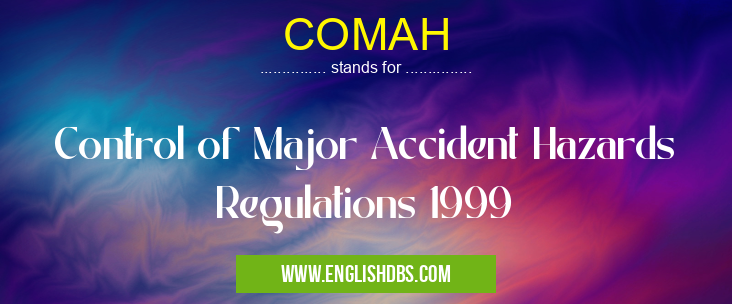What does COMAH mean in US GOVERNMENT
The Control of Major Accident Hazards Regulations 1999 (COMAH) are a set of regulations that require businesses who deal with hazardous substances to take certain safety measures, in order to minimize the risk of a major accident occurring. These regulations apply to businesses that handle, store or process hazardous substances and involve substantial safety risks due to their potentially-explosive nature. COMAH imposes strict rules for the prevention, control and management of such major accidents and provides specific requirements for all companies dealing with such materials. COMAH is designed to protect people, property, wildlife and the environment from potential harm due to hazardous substances.

COMAH meaning in US Government in Governmental
COMAH mostly used in an acronym US Government in Category Governmental that means Control of Major Accident Hazards Regulations 1999
Shorthand: COMAH,
Full Form: Control of Major Accident Hazards Regulations 1999
For more information of "Control of Major Accident Hazards Regulations 1999", see the section below.
Scope
COMAH applies to companies operating within Great Britain who handle substances such as flammable liquids, explosives, pressurized gasses or other highly toxic substances and whose activities have a large enough scale or potential impact that they need to be controlled more stringently than other similar activities. The purpose of the regulation is not only to guarantee compliance but also to ensure that agreed standards are being met across operations and processes related to hazardous materials. For example, one requirement is that any plant hazards must be identified and their risk assessed so appropriate control measures can be taken before an incident occurs.
Requirements by COMAH
Companies affected by COMAH must have in place comprehensive safety plans covering all possible risks associated with their processes. This includes developing procedures for dealing with major accidents, carrying out regular inspections to identify any areas at risk, ensuring staff are well trained in how to handle hazardous materials safely and investing in resources such as specialist equipment or services that can help respond effectively if an incident does occur. In addition, companies must keep detailed records for inspection purposes and provide regular reports on how their activities comply with the regulations.
Essential Questions and Answers on Control of Major Accident Hazards Regulations 1999 in "GOVERNMENTAL»USGOV"
How does the COMAH affect me?
As an employer, you may be subject to the Control of Major Accident Hazards Regulations (COMAH) which is legislation designed to prevent major accidents involving dangerous substances. If your business falls within this, then you must take reasonable steps to prevent major incidents and protect local communities and workers from potential risk.
What are hazardous substances?
Hazardous substances can be defined as any chemical, product or waste with the potential to cause harm or injury in the event of a major incident. Examples can include flammable liquids such as petrol, aerosols and even certain types of dust.
Do I have to register under COMAH?
If the total quantity of hazardous substances stored at one site is more than 10 tonnes above a lower threshold amount, then you may need to submit a registration for COMAH approval. There are also circumstances where you would be required to register if you have 'significant quantities' below this threshold.
How do I know if I am subject to COMAH?
If your business works with controlled hazardous substances and meets certain conditions set out by law, then it is likely that you will be subject to COMAH regulations. You should speak with specialist advisors for further information on how these laws may affect your business operations.
What information do I have to include on my registration application?
The registration form requires full details about your company and specific measures taken in order to ensure errant incidents do not occur at your premises. This includes details such as personnel training records, emergency plans and safety protocols for hazardous materials storage and handling procedures.
Can I be fined if I don’t comply with COMAH regulations?
Yes - failure comply with the requirements set out by COMAH can lead to prosecution which could result in fines or even prison sentences depending upon the severity of breach of regulations involved.
Who inspects my compliance with COMAH?
Your premises must adhere strictly to regulations outlined by a number of public bodies including; HSE (Health & Safety Executive), SEA (Safety Enforcement Agency), Local Authorities and Environment Agencies. Inspections may occur on-site or remotely depending on what is deemed necessary by these bodies when assessing compliance levels with laws set out by COMAH.
Final Words:
The Control of Major Accident Hazards Regulations 1999 (COMAH) offers a framework which protects people from the potential dangers posed by hazardous materials and related processes. By requiring businesses handling these types of materials to meet standards which far exceed usual safety practices, COMAH guarantees a level of protection which would otherwise not be present when dealing with highly explosive or toxic substances.
